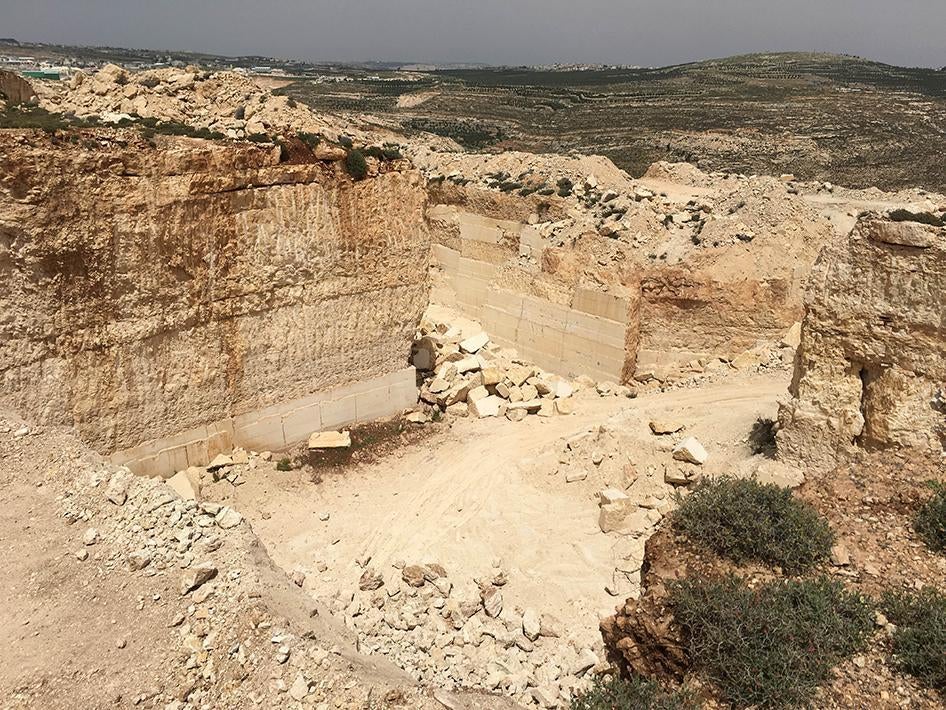In the early morning of March 21, soldiers raided about 35 quarries in the village of Beit Fajar, near Bethlehem. They detained quarry workers, confiscated excavators and drill rigs, and damaged other heavy equipment. Since then, the quarries have been shut down, and the livelihoods of the roughly 3,500 workers dependent on them have been in jeopardy.
Even as the owners of Palestinian quarries are trying desperately to re-open their businesses, the owner of an Israeli quarry has decided to close its business. Germany-based Heidelberg Cement announced three weeks ago that it would look for an alternative site to the Nahal Raba quarry, which it holds through an Israeli subsidiary. The site is one of 11 quarries run by Israeli companies in the West Bank.
Heidelberg Cement, like an increasing number of other settlement businesses, has come under pressure from investors to cease business activity in the settlements, whose existence violates international humanitarian law. The steps taken to maintain and protect these businesses contribute to human rights violations. The unlawful exploitation of the occupied territory’s natural resources, for the benefit of the occupying power, was especially problematic in this case.
In a report published in January, “Occupation Inc.,” Human Rights Watch drew the connecting line between the Beit Fajar quarries and their Heidelberg counterpart. While the Israeli Civil Administration shuts down Palestinian quarries in Beit Fajar, it allows the Nahal Raba quarry to operate on so-called state land, taken from the neighboring Palestinian village of Zawiyah. Because of a system that discriminates against Palestinian businesses in favor of settlement businesses, and because settlements are inherently unlawful, the report recommended that businesses end their activities in or with settlements.
When I presented the report to Israeli businesspeople and government officials, they said that shutting down settlement businesses would hurt the 26,000 Palestinian laborers who receive permits to work in them. A top industrialist contended that Palestinian businesses cannot compete with the efficiency, skills and scale of Israeli business, and so it is better for Palestinians to work for Israeli employers and learn from them.
It’s not clear, though, what the Beit Fajar quarry owners are learning these days. They are not talking about efficiency improvements and streamlining production following Israeli businesses’ awe-inspiring example. They are talking about surviving following the anger- and despair-provoking harassment by the Israeli authorities. They can’t even get Israeli authorities to return the confiscated equipment. The Civil Administration is conditioning its return on a commitment to stop operating the quarries and to pay retroactive extraction fees. It alleges that the quarries operated without licenses and created safety and environmental hazards.
Like most Palestinian quarries, the Beit Fajar quarries are in Area C, the 60 percent of the West Bank over which Israel exercises complete control. Since 1994, the Civil Administration has not issued a single new license to a Palestinian quarry, and in many cases, it stopped renewing existing licenses. Fewer than 10 of the 300 Palestinian quarries in the West Bank now have an Israeli license.
If the Civil Administration were concerned about protecting Palestinian villagers and the environment, it would have maintained a functioning licensing system that would enable monitoring safety and protecting the environment. The timing of the raids on the quarries – four days after two residents of Beit Fajar stabbed and wounded an Israeli soldier – raises concerns about forbidden collective punishment.
The paralysis that quarry owners in Beit Fajar face exemplifies the restrictions that Israel imposes on Palestinian construction, licensing and development in Area C, primarily for the benefit of settlements and the competing businesses operating inside them. The World Bank estimates that these restrictions cost the Palestinian economy $3.4 billion each year.
Such restrictions violate Israel’s duty, as the occupying power administering the territory, to act for the benefit of the Palestinian civilian population. They contradict senior security officials’ statements that Palestinian economic development is congruent with Israel’s security interests. And the restrictions bolster the grievances of people like Heidelberg’s investors and human rights activists, who point to the discrimination against Palestinian businesses and call for the cessation of business activity in and with the settlements.
Allowing the quarries in Beit Fajar to resume their operations would not legitimize Heidelberg Cement’s quarrying in Nahal Raba or any other settlement business. But it would allow hundreds of Palestinian workers to support their families and would lower the profile of a particularly egregious symbol of the injustice that the State of Israel is causing, in service of the settlements.









